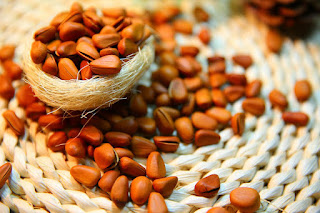Can Dogs Eat Plums?
Can Dogs Eat Plums?
Plum is a cousin of the apple, nectarine, and peach family which belongs in the Prunus genus. Plum is actually the edible fruit, which also has many health benefits and is known for its sweet taste. Health benefits of plums for dogs includes Vitamin A which is important for healthy eyesight. It is also helpful in maintaining eye and skin healthy and prevents diseases such as cancer and diabetes.
Vitamin C found in plums is good for the immunesystem. This also helps to protect against scurvy which occurs mostly in canker
sores and in fish that is highly prone to this disease. Vitamin D is also found
in plums along with folic acid, which is known for good bone health. Another
nutritional benefit of plums is that it contains relatively less amount of
calories compared to other fruits.
Due to its bitter taste, it is usually eaten as a
treat by children. It can be stored properly to prolong its shelf life and can
even be frozen to retain its freshness. However, moistened plums are not
recommended as they oxidize easily and spoil the flavor of the whole fruit.
Some people add plums to their salads or enjoy plums dipped in different types
of recipes.
Plum fruits are easy to clean and are usually dry.
To clean, soak plums in warm soapy water for about 15 minutes. Rinse off the
soapy water and set aside to dry completely. When plums are kept in an air-tight
container, they are ideal for preserving for about one year compared to other
fruits which must be preserved for several months.
Dogs are prone to some types of health problems
like skin allergies, plum poisoning, and kidney failure. It is important to
take care of such health issues immediately. Dogs are at risk of developing
urinary tract infections if they consume plums that have been stored in their
system for a long time. The reason why these fruits are a frequent cause of
canine illnesses is because of their high sugar level. If your dog eats too
much plums, it may develop diabetes because of the high level of sugar in the
bloodstream.
Another common problem associated with plums for
dogs is pit poisoning. Pit poison is characterized by a discoloration of the
fur caused by exposure to chemicals like antifreeze. Pit poisoning may occur if
your dog ingests a poisonous pit as the animal tries to get rid of it. To
minimize the risk of having this health problem, you can put the contaminated
animal in a large garbage can and flush it down.
Urine toxicity is a condition that commonly affects
small breed dogs like the Doberman and the Shih Tzu. Small dogs are more likely
to vomit or have diarrhea when exposed to urine toxins. If you notice that your
dog has been vomiting or its bowel movements are becoming irregular, seek
veterinary help immediately. A vet will be able to identify the source of the
vomiting and determine whether your dog is suffering from a form of kidney
failure or a form of skin rash that can be treated with medication.
Last but not least, you should avoid feeding your
dog plums for dogs if it has tartar. Tartar is actually the remains of the
unripe plums that have been left on the dog's teeth. Tartar coats the teeth and
can affect chewing. If you notice that your dog has developed tartar on its
teeth, you should consult your veterinarian immediately to prevent further
damage.
It is important to give dogs only quality human
food. Although they are loving and loyal animals, they should still eat
healthy, human-grade food. The nutrients found in human food are better for
pets. Even human food can be too rich in fat and grease for dogs to properly
digest. When you buy your puppy or your dog's first food from a pet store,
check the label to make sure that it contains only the most natural ingredients
that are good for dogs.
Aside from fresh plums for dogs, there are also
canned fruits that are healthier than fresh ones. Some canned fruits are more
suitable for pets than others, so make sure you read the label carefully. Some
fruits are higher in sugar than other fruits, which can cause canine diabetes.
You should also be wary about artificial flavors. Some manufacturers use
chemicals that may upset your dog's stomach.
In dealing with diarrhea caused by excessive sugar
in the diet, it is first important to reduce the amount of table sugar your dog
eats. If your pooch drinks a lot of water or gets heavy meals, then you should
have him go to the vet immediately because it may be a symptom of an underlying
health problem. Some types of kidney disease require a detoxification period in
order for the kidneys to function properly again. If your dog has diarrhea
brought on by bacteria, you should put some fresh plums or fresh prunes to his
food. These foods contain high levels of fiber and will help your dog remain
regular.




Comments
Post a Comment